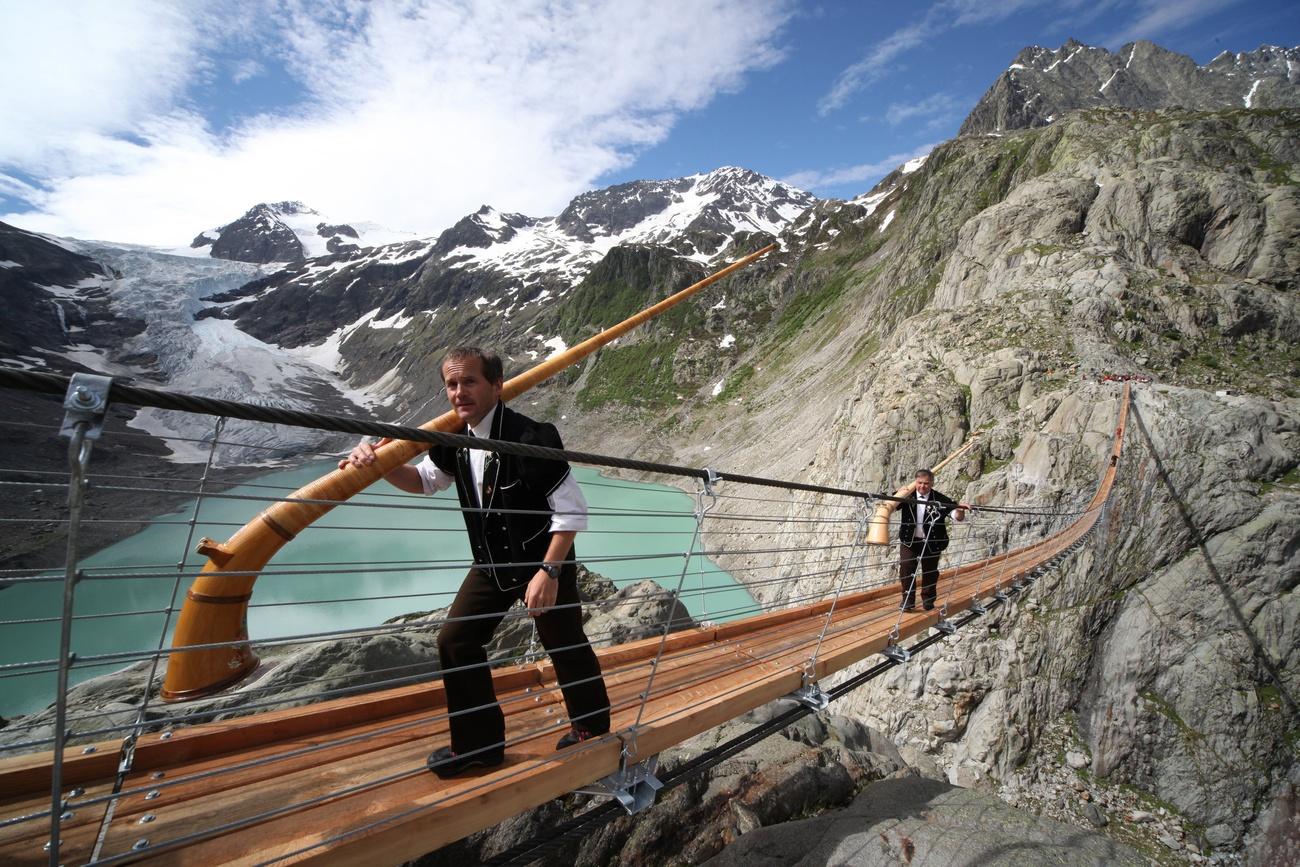Is the climate crisis a threat to human rights?

Legal action taken by a Swiss group at the European Court of Human Rights could create a precedent in Europe and the world. A coalition of senior citizens is accusing Switzerland of pursuing a climate policy that violates their right to life.
“We’ve known for some time that the climate crisis needs to be dealt with urgently, but we’ve done nothing. If the politicians are not doing their job, the courts need to intervene. What’s at stake here are basic rights to life and health,” Anne Mahrer, co-president of the Swiss association Senior Women for Climate Protection SwitzerlandExternal link tells SWI swissinfo.ch.
In October, the 72-year-old woman came back from Strasbourg, where “with great emotion and high hopes” she had announced a series of demands in front of the building that houses the European Court of Human Rights (ECHR). This was a symbolic act to accompany a carefully-planned lawsuit before this international court challenges Switzerland’s “negligence” in terms of climate protection measures.
By pursuing inadequate climate goals, Switzerland is violating the right to life enshrined in its own federal constitution and the European Convention on Human Rights, says Mahrer. “This is not a selfish action. If we win, everybody wins,” she asserts.
To understand how the seniors’ group ended up before the Strasbourg judges, we have to go back a few years, more precisely to June 24, 2015, when a decision was announced that was called “revolutionary” at the time.

Dutch example
“I was a member of parliament in Bern, and we were discussing the new legislation on CO2 and how no progress was being made in climate policy,” recalls Mahrer, who was a Green Party politician at the time. “The inspiration came from the Netherlands.”
Mahrer is referring to a decision of the Hague district court which approved an application from a group of 886 citizens, supported by the environmental foundation Urgenda, and instructed the Dutch government to start doing more to bring down CO2 emissions. It was the first time that a court had ordered a state to meet the requirements of international agreements on climate change. This decision was confirmedExternal link in December 2019 by the Dutch Supreme Court.
“The Netherlands is quite directly threatened by rising sea levels, which is a problem we obviously don’t have here in Switzerland. But this country and the whole Alpine region are under threat too. Glaciers are melting and permafrost thaw is increasing the risk of landslides, which means a real threat to villages and populations living in the mountains,” Mahrer points out.
In August 2016, with the involvement of Greenpeace, the association Senior Women for Climate Protection was founded in Switzerland. “In this country there is no legal framework for class action suits. So we formed an association bringing together the people most vulnerable to climate change and especially heatwaves,” explains Mahrer.
Women more affected than men
As the Federal Office for Public Health has confirmed, those most affected by heatwaves are people aged over 65. During the heatwave of summer 2003 (which caused 975 premature deaths in Switzerland, and over 70,000 in Europe), mortality in this group increased steeply. According to studies citedExternal link by the World Health Organisation, women are more at risk than men.
Mahrer’s association is aware that older men, people in poor health, and children also suffer due to heatwaves and global warming. Their focus on elderly women, a specific group, means they are more likely to succeed in a lawsuit “which will benefit everyone”, she states.
Approaches got nowhere
The newly formed climate group lost no time, and a few months after their founding meeting they were officially presenting their petition to the federal government: by 2020, Switzerland should cut its emissions by at least 25%, instead of the 20% target already set by the government, and should adopt more ambitious goals for the year 2030. If this is not done, they warned, the goal of keeping global warming to 2°C will not be met, which would endanger the health and life of elderly women.
The Federal Office for the Environment decided not to act on the petition, so the association took the matter to the Federal Administrative Court.
The suit was rejected by the court, on the grounds that over-65s are not the only demographic group affected by climate change. The women’s group did not give up, but pursued the matter in Switzerland’s highest court.
‘Courts need to intervene’
There too they got no satisfaction, though it was for other reasons this time. The judges found that the two degree goal is still too far off, so it is not yet possible to say that it will not be met. In other words, it is too soon for the judiciary to concern themselves with the issue.
Furthermore, the court found, matters of this kind should not be a matter for lawsuits, but dealt with through political and democratic channels.
Mahrer believes that judges in Switzerland did not have the fortitude to deal with the basic issue of respect for basic rights with regard to climate. “That’s why we went to Strasbourg.”
The Swiss association, which has some 1,700 members, all women of pensionable age, is one of the first to bring the issue of human rights and environment to the ECHR. It is not, however, the only one to take the judicial route.
Legal action around the world
“The courts are increasingly important in the matter of dealing with the issue of climate change,” notes Hari M. Osofsky, dean of the Penn State Law School of International Affairs, as quoted by ReutersExternal link. Just 20 years ago there were no more than ten court cases concering climate issues globally; today there are 1,600, of which 1,200 are in the US alone.
Besides the Dutch case, legal action has been taken against national governments in Canada, Colombia, Germany, France, Belgium, the United Kingdom, Norway, New Zealand, India and Mexico, to mention just a few. Some of these actions have been successful.
At the end of July, the Irish Supreme Court instructed the government to review its climate policy, which it found to be inadequate. More recently, on November 19, the French Council of State issued an ultimatum to the government in Paris, giving it three months to show that the timetable for reduction of emissions (-40% by 2030) can still be met.
“Most climate and environmental agreements are still insufficient to tackle the most imminent and urgent issues concerning the environment,” says Seraina Petersen, co-director of a diplomacy programme at the Swiss Forum on Foreign Policy (Foraus).
“To achieve long-term and profound progress in environmental governance, policy focus needs to be complemented by intensified efforts to strengthen the rule of environmental law. To do so, the capacity of international courts to pronounce judgements on environmental matters, the clarity and scope of environmental legal principles, and compliance with and implementation of judgements must be further strengthened,” she statedExternal link.
A precedent for Europe and the world
While waiting for the Human Rights court to rule on the admissibility of the lawsuit and then reach a decision – which could take years – Mahrer remains confident. “The Court seems to be taking the relationship between climate protection and human rights more seriously now. The UN High Commission on Human Rights has statedExternal link that climate change represents a threat to human rights and that states need to protect their populations,” she points out.
Georg Klinger, a climate specialist with Greenpeace Switzerland, says that it is quite likely that the Swiss lawsuit will be considered by the ECHR, and that this would create “a precedent for Europe and the world”.
This view is shared by Rainer J. Schweizer, who is professor of public law at the University of St Gallen. Whereas the ECHR turns down most of the applications it receives, he told Swiss national radio, the Swiss case is “of such fundamental importance for the interpretation and application of the European Convention on Human Rights that the human rights court might well want to examine the issue”.
Translated from Italian by Terence MacNamee

In compliance with the JTI standards
More: SWI swissinfo.ch certified by the Journalism Trust Initiative















You can find an overview of ongoing debates with our journalists here . Please join us!
If you want to start a conversation about a topic raised in this article or want to report factual errors, email us at english@swissinfo.ch.